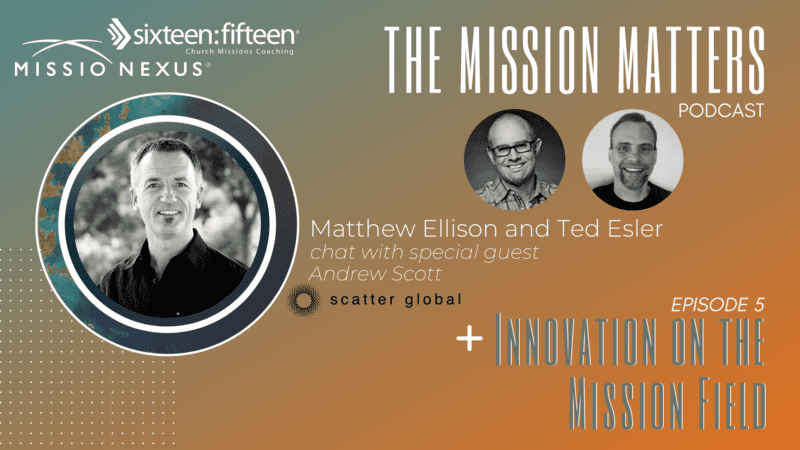Missiology—Good Medicine and a Fourth Leg
by Gary Corwin
I have sometimes joked that like a bowl of fruit, a missiologist is a missionary that has gone bad from spending too much time sitting around tables.
I have sometimes joked that like a bowl of fruit, a missiologist is a missionary that has gone bad from spending too much time sitting around tables. While perhaps truer than I might like to admit, that still does not quite get to the essence of missiology. Missiology is most basically a reflection on the task of mission. While academics tend to think of it in formal terms of writing and lecturing, good practitioners do it regularly. We call that applied missiology.
Missiology is not like a package that can be delivered as one tidy bundle to even the brightest and most distinguished among us. It is more like the field of medicine. You do not want to know about lung disease when you have appendicitis, or about heart palpitations when you have bronchitis. Neither do you want to know about the Apostle Paul’s focus on urban centers when your problem is what people will understand by the word “sin.” Missiology as a body of wisdom and experience can provide valuable insight to help address challenges and solve problems. It does not often provide neat answers, however, except where our authoritative Bible speaks clearly to an issue.
Missiology has commonly been thought of as a stool resting on three legs—the Bible, history and the social sciences. The social sciences, of course, are the usual catch-all that encompass everything that does not fit under the narrower rubrics of the Bible or history. The problem with the stool analogy, however, is that it underemphasizes a crucial fourth dimension or “leg”; namely, the need to factor in what one might call the “global context.”
As used here, global context refers to those dominant secular forces, systems and ideas that define eras and tend to shape the way mission is actually carried out during a particular span of time. While these are sometimes treated and analyzed within the study of church and mission history, this is generally too rare, too cursory or both. Individual and regional stories and contexts are examined, but the true importance of global context is seldom recognized. The result is that because we seldom acknowledge the importance of global context in these earlier eras, we have a hard time recognizing its import in our own.
Some past examples where global context was singularly important in defining how mission was pursued might include: the first three centuries of the Church with Roman efforts to impose universal imperial religion; the Christianization of empires in the fourth century; or the subsequent feudalization of society in the post-empire period. At the other end of the Church’s history, one might look at: the mercantile and slavery paradigm of the eighteenth and early nineteenth centuries; the industrial era and the colonial structuring of the world in the late nineteenth and early twentieth centuries; or the Cold War and Pax Americana period of the late twentieth century. For both good and ill, each of these global contexts had enormous impact on the way mission was actually carried out.
Now in the twenty-first century, we function in a global context shaped in significantly new ways by globalization, asymmetrical warfare and information technology. This is not to downplay the impact of factors such as postmodern secular relativism in the West or the rise of militant religious fanaticism, but it is to suggest that we are often too narrow in our analysis of the times and challenges we face.
The impact of globalization, for example, is that isolation is waning, but anger against its loss is not. It is fostering greater distance between generations which tend to view the changes very differently. It has created new opportunities for the gospel, but also new hazards. It is making the harvest force a truly global one, but it has also created a backlash among those wishing to preserve traditional societies and norms. (See Friedman 2000, 2005.)
Asymmetrical warfare waged by relatively small non-governmental groups in non-conventional ways (e.g., targeting civilians, suicide bombings, seeking to foster appeasement through the use of terror) is now the primary challenge to world peace. Combined with the militant religious fanaticism discussed above, it is a great challenge to effective ministry among least-reached peoples today, yet it may be opening hearts among those who recoil at its methods.
Finally, information technology (IT) has created an entirely new playing field for mission. It is fast changing and enormously powerful. It currently includes ubiquitous cell phones, Satellite TV and the Internet; however, each of these is multiplying new applications and functions faster than this aging man can keep up with. The important point to note is that IT changes everything because it diminishes social control over ideas and reduces isolation (see Corwin 2005). IT empowers people to get information for themselves. Imams, governments and autocrats are losing their grip because increasingly people can make up their own minds. This is very fertile ground for the gospel.
As a source of both hope and warning, let us not forget to employ all that missiology offers us, including insights from global context—missiology’s fourth leg!
References
Corwin, Gary. 2005. “New Opportunities and Challenges” Evangelical Missions Quarterly. (41)4: 414-415.
Friedman, Thomas. 2000. The Lexus and the Olive Tree. HarperCollins: London.
_____. 2005. The World Is Flat. Farrar, Straus and Giroux: New York.
—–
Gary Corwin is associate editor of EMQ and missiologist-at-large for Arab World Ministries, on loan from SIM-USA.
Copyright © 2007 Evangelism and Missions Information Service (EMIS). All rights reserved. Not to be reproduced or copied in any form without written permission from EMIS.





